Anti-monuments in Mexico


In Mexico, antimonumentos (transl. anti-monument) are installed and traditionally placed during popular protests. They are installed to recall a tragic event or to maintain the claim for justice to which governments have failed to provide a satisfactory response in the eyes of the complainant.[1] Many of these are erected for issues related to forced disappearances, massacres, femicides and other forms of violence against women, or any other act of violence.
Concept
[edit]The term anti-monument finds its genealogy in the reflections of James E. Young. After World War II, Young looked at "those devices of memory that do not seek to glorify national glory but to do a living memory work through the experiences of the victims", in contrast to the traditional monuments that exalted nationalist heroism.[1] In Latin America, anti-monuments emerged as a way of dealing through the arts with "the violence of the State, as in the cases of Nazism and Latin American dictatorships".[2]
In Mexico, anti-monuments have emerged as protest art and a rejection of the state. If traditional monuments are usually installed by the state to last and represent official positions, the anti-monument has the opposite function which "does not imply a denial of the importance of monuments".[3] That is, it tries to remember those victims who did not achieve justice so that "their cases do not fall into oblivion".[4] Thus, according to anthropologist Alfonso Díaz Tovar, the anti-monuments arise in this way to "deconstruct" the "official positions through an appropriation of public space".[4] The anti-monuments have also been interpreted as "a new way of dealing with the new role of memory".[1] According to the authors of the Antimonumento +43, the first anti-monument, they decided to use the term antimonumento because they considered an error to name it a monumento, as those refer to the past and they did not want the Iguala mass kidnapping to be forgotten. Even though they considered calling it contramonumento at some point, they agreed with the name antimonumento instead.[5]: 18
Cause and implications
[edit]
Mexico, in addition to having one of the highest crime rates in the world, also is a country where nine out of ten reported crimes are left unpunished.[1][4] As a result, anti-monuments have emerged as a way to remember the victims and prevent their cases from falling into oblivion.[4] For Rosa Salazar, a human rights, communication, and ICT Laboratory coordinator, anti-monuments have a function similar to that of memorials.[6] Anti-monuments leave behind the idea that aesthetic objects "were only judged by their beauty, according to a given artistic canon". Apart from their aesthetic appearance, anti-monuments are "artifacts charged with affection" that, with their subversive activities in the public space, tend to reinstate its communitarian sense.[1] For Eunice Hernández, a cultural facilitator, their location is key to prevent the issue from fading into oblivion, since those spaces are emblematic and represent a hegemonic power.[7]
Government position
[edit]Anti-monuments are rarely removed by the authorities once they are established. Although not removing them can affect the image of the government, removing them would imply that they have no interest in resolving the cause of their placement. After being installed, several sit-in groups remain in the area watching over the anti-monuments to prevent the authorities from removing them.[8] In some instances, some governments have installed their own anti-monuments and in other cases have tried to dialogue with the protesters to decide where or how they should be installed. For philosopher Irene Tello Arista, these actions represent an absence of political commitment to change the situation that originated them.[9]
Antimonumenta
[edit]
The antimonumenta is a type of anti-monument erected to demand justice for the victims of gender violence and femicides in the country.[9] The first antimonumenta was erected on 8 March 2019, the date commemorating International Women's Day. It was installed on Juárez Avenue, in front of the Palace of Fine Arts in downtown Mexico City during the annual march of women protesting against gender violence. Since then, similar monuments have been installed throughout the country.[10] The Antimonumenta represents the symbol of the feminist struggle, which is based on the symbol of Venus with a raised fist in the center. The antimonumentas of Mexico City and Guadalajara, for example, are purple. The color represents the history of the feminist struggle: "loyalty, constancy towards a purpose, unwavering firmness towards a cause".[11]
List of anti-monuments
[edit]| Picture | Name[a] | In memory of | Description | State | Location | Date of installation |
|---|---|---|---|---|---|---|
 | Antimonumento +43 | The students that were abducted during the 2014 Iguala mass kidnapping. | The anti-monument features a "Plus 43" and a "Because they were taken alive, we want them alive!" slogan in reference to the 43 students that were kidnapped as they were traveling to commemorate the anniversary of the 1968 Tlatelolco massacre. Six other students were killed.[12] In 2018, a concrete turtle whose shell contains 43 little turtles and whose limbs bear the names of the students, was built in front of the anti-monument.[13] | Mexico City | Esquina de la Información, Paseo de la Reforma Avenue, Colonia Centro | 26 April 2015 |
 | 25 September 2018 | |||||
 | Antimonumento 49 ABC | The 49 children who died during the 2009 Hermosillo daycare center fire. | The anti-monument has a 49 and the letters "ABC" in reference to the name of the daycare where the 49 children were killed. The daycare was owned by the Mexican Social Security Institute (IMSS).[14] Two years later, multiple bronze statues of children's shoes with the names of the victims were placed next to it.[15] | IMSS Headquarters, Paseo de la Reforma Avenue, Colonia Juárez | 5 June 2017 | |
 | 5 June 2019 | |||||
 | #JusticiaABC | 49 white crosses with the names of the victims.[16] | Secretariat of the Interior Offices, Abraham González Street, Colonia Juárez | 3 November 2020 | ||
 | David y Miguel | David Ramírez and Miguel Ángel Rivera, who were kidnapped on 5 January 2012. Although the ransom payment was made, both were not returned and their whereabouts or conditions are unknown.[14] | The plaque calls for padlocks to be placed as a sign of protest.[17] | Esquina de la Información, Paseo de la Reforma Avenue, Colonia Juárez | 5 January 2018 | |
 | Antimonumento +65 | The 65 miners that died during the 2006 Pasta de Conchos mine disaster. | The main anti-monument features a 65 number that supports a plus symbol. The symbol has written a legend that says "With one voice, rescue now!", as well as the names of all the victims of the collapse.[12] The following day, across the street a cage with 63 helmets with the names of the victims that were not rescued was placed buried with charcoal lumps.[18] | In front of the Mexican Stock Exchange Building, Paseo de la Reforma Avenue, Colonia Juárez | 18 February 2018 | |
 | 19 February 2018 | |||||
 | 2 de Octubre | The victims of the Tlatelolco massacre | The anti-monument features a white dove and a plaque that blames the Government of Mexico and the Mexican Armed Forces for the massacre.[12] | In the corner of Madero Street and the Zócalo, Colonia Centro | 2 October 2018 | |
 | Antimonumenta | Victims of femicide | It was placed by mothers and relatives of victims of feminicide, during the march #8M for the International Women's Day.[19] | In front of the Palace of Fine Arts, Juárez Avenue, Colonia Juárez | 8 March 2019 | |
| Antimonumenta | It was installed to commemorate the seventh anniversary of the killing of Karla Pontigo Lucciotto and the 60 women murdered between 2010 and 2018. It was destroyed within a month.[20][21] | San Luís Potosí | Plaza de Armas, historic center of San Luis Potosí City | 27 October 2019 | ||
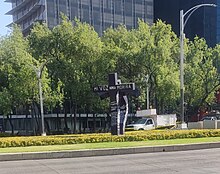 | Cruz de Vida | It was dedicated to murdered and abused women.[22] | Mexico City | Paseo de la Reforma and Avenida de los Insurgentes | 1 December 2019 | |
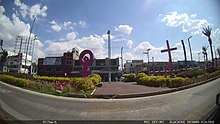 | Antimonumenta | It was installed during the International Day for the Elimination of Violence against Women to memorialize the women murdered in the state of Mexico.[23] | State of Mexico | In front of the municipal palace of Ciudad Nezahualcóyotl | 25 November 2019 | |
 | Antimonumenta | It was installed during the International Day for the Elimination of Violence against Women to memorialize the women murdered in the state of Jalisco.[24] | Jalisco | Plaza de Armas, Colonia Centro, Guadalajara | 25 November 2020 | |
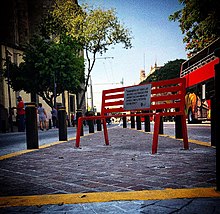 | Antimonumenta (Banca Roja)[25] | It was installed during the International Day for the Elimination of Violence against Women. It has a plaque that reads "In memory of all the women murdered by those who claimed to love them or just because they were women" in Spanish.[26] | In front of the Rotonda de los Jaliscienses Ilustres, Hidalgo Avenue, Colonia Centro, Guadalajara | |||
 | Memorial por víctimas de feminicidio | It was installed during the International Day for the Elimination of Violence against Women. It reads "In memory of all the female children, adolescents and women victims of femicide violence. Truth and Justice!" in Spanish.[27] | Hidalgo | Plaza Juárez, Colonia Centro, Pachuca | ||
| Antimonumenta | It was installed during protests where the feminists took the Chetumal Congress. The anti-monument was later destroyed and a replica was installed.[28] | Quintana Roo | Chetumal Congress, Colonia Barrio Bravo, Chetumal | 30 November 2020 | ||
| Antimonumenta | It was installed during International Women's Day protests. | Veracruz | Parque Apolinar Castillo, Colonia Centro, Orizaba[29] | 7 March 2021 | ||
| Antimonumenta | Michoacán | Fuente de las Tarascas, Colonia Centro, Morelia[30] | 8 March 2021 | |||
| Antimonumenta | Veracruz | Port of Veracruz, Colonia Ignacio Zaragoza, Veracruz City[31] | ||||
 | Glorieta de las mujeres que luchan | The sculpture was placed on the empty plinth of the Columbus Roundabout.[32] | Mexico City | Former Columbus Roundabout, Paseo de la Reforma, Colonia Juárez | 25 September 2021 | |
| Antimonumenta | It was installed during the International Day for the Elimination of Violence against Women to memorialize the women murdered in the state of Oaxaca.[33] | Oaxaca | Fuente de las 8 Regiones, Colonia Reforma, Oaxaca City | 25 November 2021 | ||
| Antimonumenta | It was installed during the International Day for the Elimination of Violence against Women to memorialize the women murdered in the state of Yucatán.[34] | Yucatán | Paseo de Montejo, Mérida | |||
 | Antimonumenta, Monumenta Viva | It was installed after an increase in disappearances and femicides in the state, including the killing of Debanhi Escobar.[35] | Nuevo León | Government Palace of Nuevo León, Monterrey | 15 May 2022 | |
| Antimonumento del New's Divine | The victims killed during the New's Divine fire | It was installed in memory of those killed during the event.[36] | In front of National Palace, Zócalo, Centro | Mexico City | 22 June 2019 | |
 | Bust of Samir Flores Soberanes | Samir Flores Soberanes, who opposed the construction of a federal hydroelectric plant in his community. | One year after his assassination, a bust was placed in the school named after him in the community of Amilcingo, Morelos.[37] The next day, after a related march in Mexico City, a replica of the bust (pictured) was placed in the Zócalo square.[38] | Morelos | Amilcingo, Temoac Municipality | 20 February 2020 |
| Mexico City | Zócalo, Colonia Centro | 21 February 2020 | ||||
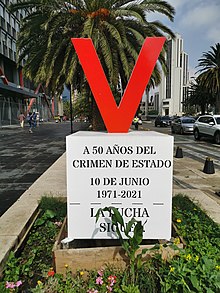 | Antimonumento a El Halconazo | The victims of the 1971 Corpus Christi massacre | The monument features a red V and phrases that blame the Government of Mexico for the massacre.[39] | Juárez Avenue and Humboldt Street | 10 June 2021 | |
 | Antimonumento +72 | The 72 migrants murdered during the 2010 San Fernando massacre | It was installed to remember that migration is a human right.[40][41] | In front of the Embassy of the United States Building, Paseo de la Reforma, Colonia Juárez | 22 August 2020 | |
| Árbol de la Esperanza | Missing residents of Puebla | With the permission of the Puebla City Council, residents placed photographs of several missing persons on trees in the streets of the historic center. The next day, the photographs were removed to place Christmas decorations.[42] | Puebla | Historic center of Puebla City | 5 December 2021 | |
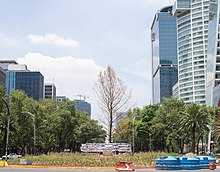 | Glorieta de las y los Desaparecidos | The more than 100,000 missing persons in the country | It was installed by collectives that sought to make visible the numbers of missing persons. The anti-monument was removed by the city government but was reinstalled days later.[43] | Glorieta de la Palma roundabout | Mexico City | 8 May 2022 |
| Antimonumento al Tren Maya | The Mayan jungle and its human and animal population | It was installed by environmentalists protesting against the Mayan Train, which will pass through several jungle zones. The plaque reads, "Here we put on record that in the name of 'development' and 'progress' the Mayan Train was built, evicting people, extinguishing species, devastating the jungle, and threatening ecosystems. Only you, in the future, will be able to say if it was worth it..."[44] | Esquina de la Información, Paseo de la Reforma Avenue, Colonia Centro | 23 November 2022 | ||
 | Antimonumento 5J | The demonstrators arrested during protests related to the death of Giovanni López | It was installed adjacent to the Antimonumenta on the third anniversary of "El Halconazo Jaliciense" when police officers disappeared for hours demonstrators claiming the death of López.[45] | Plaza de Armas, Colonia Centro, Guadalajara | Jalisco | 5 June 2023 |
| Liga Comunista 23 de Septiembre | People who were killed or disappeared by the government of Mexico in their struggle to establish a communist government in the country. | Placed during the 50th anniversary of the creation of the Liga Comunista 23 de Septiembre.[46] | Plaza San Andrés, Colonia San Andrés, Guadalajara | 23 September 2023 |
#FueMorena
[edit]
#FueMorena (lit. 'Was MORENA') was a temporary political stunt installed by members of the National Action Party (PAN) on the eve of the first anniversary of the Mexico City Metro overpass collapse, where 26 people died. It was installed in front of the Antimonumento +43 at the Esquina de la Información, where Paseo de la Reforma, Avenida Juárez and Avenida Bucareli converge. The politicians described it as an antimonumento and they blamed the National Regeneration Movement Party (MORENA) for the collapse and the lack of justice surrounding the investigations.[47]
The installation received negative criticism from activists who have placed anti-monuments, considering it disrespectful and an appropriation of their movement for political purposes,[48] adding, "[t]o them, as to all political parties, we demand respect, that you refrain from looking at the big debts just to win votes. As long as you do not resolve them, you are accomplices of impunity".[49] MORENA politicians called their PAN counterparts "opportunistic vultures" and called the installation an act of politicking.[50]
See also
[edit]- Feminism in Mexico
- Guerrilla sculpture
- Memorial to Victims of Violence in Mexico, a memorial installed by the government in 2013
- Monumento a los Niños Héroes (Guadalajara), a traffic circle in which the city authorities allowed the transformation into a memorial
- Parque de las Mujeres, a park in Puerto Vallarta with a memorial to victims of femicide
Notes
[edit]- ^ Because most of the anti-monuments are unnamed anonymous works, and the press refers to them simply as "Antimonumentos", some names are unofficial and use recognizable elements to distinguish them from other similar works.
References
[edit]- ^ a b c d e "Antimonumentos: intervenciones, arte, memoria – InfoActivismo.org" (in Spanish). Archived from the original on 27 October 2021. Retrieved 20 November 2021.
- ^ Seligmann-Silva, Márcio (April 2016). "Antimonumentos: trabalho de memória e de resistência". Psicologia USP (in Portuguese). 27 (1): 49–60. doi:10.1590/0103-6564d20150011.
- ^ Lacruz, M. Elena; Ramírez, Juan (2017). "Anti-monumentos. Recordando el futuro a través de los lugares abandonados". Revista Rita. No. 7. pp. 86–91.
- ^ a b c d González Díaz, Marcos (8 December 2020). "Why are 'anti-monuments' appearing in Mexico (and how they reflect the darkest episodes in its recent history)". Digismak. BBC News. Archived from the original on 4 January 2022. Retrieved 20 November 2021.
- ^ Antimonumentos: Memoria, Verdad y Justicia [Anti-monuments: Memory, Truth and Justice] (PDF) (in Spanish) (2nd ed.). Heinrich Böll Foundation. December 2021. ISBN 978-607-99582-4-4. Archived (PDF) from the original on 17 November 2022. Retrieved 17 November 2022.
- ^ a b Galván, Melissa (13 March 2021). "México, el país de los antimonumentos que exigen acabar con la impunidad" [Mexico, the country of anti-monuments demanding an end to impunity]. Expansión. Archived from the original on 17 December 2021. Retrieved 16 December 2021.
- ^ Hernández, Eunice (2 October 2020). "Dimensiones y paradojas de los antimonumentos en la Ciudad de México" [Dimensions and paradoxes of the anti-monuments in Mexico City]. Este País (in Spanish). Archived from the original on 27 December 2021. Retrieved 27 December 2021.
- ^ Muñoz Ramírez, Gloria (3 June 2019). "Antimonumentos, la ruta por la memoria amenazada" [Anti-monuments, the route for threatened memory]. Desinformémonos.org (in Spanish). Archived from the original on 13 December 2021. Retrieved 13 December 2021.
- ^ a b Tello Arista, Irene (May 2021). "Arrebatar las narrativas" [To snatch the narratives]. Revista de la Universidad de México (in Spanish). Archived from the original on 11 May 2021. Retrieved 3 January 2021.
- ^ "Cinco Estados de México colocan antimonumenta por los feminicidios" [Five states of Mexico place the Animonumenta due to femicies]. Voces Feministas (in Spanish). Tuxtla Gutiérrez. 2 December 2020. Archived from the original on 13 December 2021. Retrieved 13 December 2021.
- ^ García, Paula (6 March 2019). "Este es el origen de los símbolos feministas". Hipertextual. Archived from the original on 6 March 2019. Retrieved 20 November 2021.
- ^ a b c ""Anti-monuments" commemorating tragedies flourish in Mexico City". EFE. Mexico City. 18 November 2018. Archived from the original on 11 January 2022. Retrieved 10 January 2022.
- ^ "Colocan caparazón de 43 tortugas en el antimonumento de Ayotzinapa (Video)". Aristegui Noticias (in Spanish). 25 September 2018. Archived from the original on 11 January 2022. Retrieved 11 January 2022.
- ^ a b Guthrie, Amy (30 June 2019). "Mexico 'anti-monuments' recall dark moments, demand justice". ABC News. Associated Press. Archived from the original on 11 January 2022. Retrieved 10 January 2022.
- ^ Ortiz, Alexis; Miranda, Perla (5 June 2019). "Instalan zapatitos de bronce en antimonumento de la Guardería ABC". El Universal (in Spanish). Archived from the original on 11 January 2022. Retrieved 11 January 2022.
- ^ "Rechazan padres de víctimas de Guardería ABC reunirse con Encinas". MVS Noticias (in Spanish). 3 November 2020. Archived from the original on 3 November 2020. Retrieved 4 November 2020.
- ^ Rodríguez, Marco (9 March 2018). "El Memorial de David y Miguel". Grupo Radiofónico y Medios. Archived from the original on 11 January 2022. Retrieved 10 January 2022.
- ^ Gómez, Nancy (19 February 2019). "Instalan nuevo antimonumento por mineros de Pasta de Conchos". SDPNoticias (in Spanish). Archived from the original on 11 January 2022. Retrieved 10 January 2022.
- ^ Gómez, Nancy (8 March 2019). "Marcha #8M2019; instalan antimonumenta por feminicidios". SDPNoticias (in Spanish). Archived from the original on 30 July 2019. Retrieved 11 March 2019.
- ^ Medrano, María (28 October 2019). "Colocan 'antimonumenta' en memoria de víctimas de feminicidio". El Universal (in Spanish). San Luis Potosí City. Archived from the original on 5 November 2019. Retrieved 2 May 2022.
- ^ Pacheco, Rubén (25 November 2019). "Destruyen "antimonumenta feminista" colocada en la Plaza de Armas". Pulso (in Spanish). Archived from the original on 27 November 2019. Retrieved 2 May 2022.
- ^ "Nos llenamos de 'antimonumentos'". Ciudadanos en Red (in Spanish). 1 March 2020. Retrieved 12 July 2023.
- ^ "Edomex, epicentrode feminicidios, olvidado en marcha feminista". La Silla Rota (in Spanish). 26 November 2019. Archived from the original on 11 January 2022. Retrieved 10 January 2022.
- ^ "Instalan la Antimonumenta, parte de la lucha feminista, en Plaza de Armas" [Antimonumenta, part of the feminist struggle, installed at Plaza de Armas]. Notisistema (in Spanish). 25 November 2020. Archived from the original on 27 December 2021. Retrieved 26 December 2021.
- ^ "Feminicidios. Mujeres de Jalisco colocan antimonumenta vs violencia". Milenio (in Mexican Spanish). Archived from the original on 20 November 2021. Retrieved 5 December 2020.
- ^ Ruiz, Josefina (25 November 2020). "Colocan antimonumenta en memoria de mujeres asesinadas en la Rotonda". Milenio. Archived from the original on 14 December 2021. Retrieved 13 December 2021.
- ^ Rosas, Lorena (25 November 2020). "#25N: Colocan memorial por víctimas de feminicidio en Plaza Juárez". La Silla rota (in Spanish). Archived from the original on 11 January 2022. Retrieved 10 January 2022.
- ^ Maldonado, Joana (25 June 2021). "Reinstalarán la antimonumenta este sábado en Chetumal". La Jornada (in Spanish). Cancun. Archived from the original on 11 January 2022. Retrieved 10 January 2022.
- ^ Renaud, Jhennifer (7 March 2021). "[Video] Instalan antimonumenta; Colectivos exigen justicia". El Sol de Orizaba (in Spanish). Orizaba. Archived from the original on 11 January 2022. Retrieved 10 January 2022.
- ^ Padilla, Blanca (25 April 2021). "Colectivos reinstalan antimonumenta en las Tarascas" [Colevtives reinstall Antimonumenta at Las Tarascas]. Meganoticias (in Spanish). Archived from the original on 30 December 2021. Retrieved 30 December 2021.
- ^ "Mujeres feministas buscan dialogo para reubicar la 'Antimonumenta'". El Dictamen (in Spanish). 10 March 2021. Archived from the original on 30 December 2021. Retrieved 10 January 2022.
- ^ "Mexican feminists install a statue of a woman to replace one where Columbus stood". The Fresno Bee. Mexico City. EFE. 25 September 2021. Retrieved 9 October 2021.
- ^ Jiménez, Christian (25 November 2021). "Con indignación y Antimonumenta contra feminicidios, mujeres de Oaxaca exigen freno a la violencia" (in Spanish). Archived from the original on 11 January 2022. Retrieved 10 January 2022.
- ^ "After demonstrating Feminist Anti-monument is unveiled in Paseo de Montejo". The Yucatan Times. Mérida, Yucatán. 26 November 2021. Archived from the original on 11 January 2022. Retrieved 10 January 2022.
- ^ "Colectivos de Nuevo León colocan primera Antimonumenta del norte del país" [Collectives of Nuevo León place the first Antimonumenta in the north of the country]. Publimetro (in Spanish). 15 May 2022. Archived from the original on 20 May 2022. Retrieved 20 May 2022.
- ^ "Familiares de víctimas del News Divine colocan antimonumento en el Zócalo capitalino". El Financiero (in Spanish). Notimex. 20 June 2019. Archived from the original on 28 August 2022. Retrieved 28 August 2022.
- ^ Ríos, Emmanuel (12 February 2020). "Develarán monumento a Samir Flores en Amilcingo". El Sol de Cuautla (in Spanish). Archived from the original on 11 January 2022. Retrieved 10 January 2022.
- ^ Pillardo, Ángeles (21 February 2020). "Instalan busto de Samir Flores en el Zócalo de la CDMX". SDPNoticias (in Spanish). Archived from the original on 11 January 2022. Retrieved 10 January 2022.
- ^ "Colocan antimonumento por víctimas del "Halconazo" en Avenida Juárez". El Universal (in Spanish). 10 June 2021. Archived from the original on 11 January 2022. Retrieved 10 January 2022.
- ^ "Colocan antimonumento por los 72 migrantes masacrados en San Fernando". Desinformémonos (in Spanish). 22 August 2020. Archived from the original on 20 November 2021. Retrieved 22 August 2020.
- ^ "Colocan antimonumento frente a embajada de EU". Excélsior (in Spanish). 22 August 2020. Archived from the original on 20 November 2021. Retrieved 22 August 2020.
- ^ "Ayuntamiento de Puebla retira Árbol de la Esperanza de personas desaparecidas". Poblanerías.com (in Spanish). 6 December 2021. Archived from the original on 25 January 2022. Retrieved 2 May 2022.
- ^ "Gobierno de la CDMX retira antimonumento a desaparecidos de la Glorieta de la Palma; la gente votó que haya otro árbol: Sheinbaum" [Mexico City government removes anti-monument to the disappeared from the Glorieta de la Palma; people voted for another tree: Sheinbaum]. Animal Político (in Spanish). 8 May 2022. Archived from the original on 25 July 2022. Retrieved 25 July 2022.
- ^ "Ambientalistas instalan antimonumento contra el Tren Maya en Paseo de la Reforma". Proceso (in Spanish). Mexico City. 23 November 2022. Archived from the original on 30 December 2022. Retrieved 29 December 2022.
- ^ Manzo, Andrea (22 June 2023). "Colectivos piden disculpa pública por retiro de antimonumento 5J; Alfaro responde, pide se olvide el tema" [Collectives demand public apology for removal of 5J anti-monument; Alfaro responds, asks to forget the issue]. Milenio (in Spanish). Retrieved 23 July 2023.
- ^ "En Guadalajara, Instalan antimonumento Liga Comunista 23 de Septiembre" [In Guadalajara, Liga Comunista 23 de Septiembre Antimonument Installed]. Chiapas Paralelo (in Spanish). Zona Docs. 24 September 2023. Retrieved 17 April 2024.
- ^ "#FueMorena: PAN CDMX coloca antimonumento por víctimas de la Línea 12 del Metro" [#FueMorena: PAN CDMX places anti-monument in honor to the victims of Line 12]. El Financiero (in Spanish). 2 May 2022. Archived from the original on 3 May 2022. Retrieved 2 May 2022.
- ^ Sanabria, Lucy (5 May 2022). "Exigen al PAN que quite el antimonumento de la L12" [PAN is demanded to remove the anti-monument of Line 12]. Sopitas (in Spanish). Retrieved 12 July 2023.
- ^ "El "antimonumento" del PAN: Muestra de que pertenecen a una clase política que no tiene límites ni dignidad" [PAN's "anti-monument": Proof that they belong to a political class that has no limits and no dignity]. Tercera Vía (in Spanish). 4 May 2022. Retrieved 16 July 2023.
- ^ ""Buitres oportunistas": Morena CDMX respondió al PAN por antimonumento sobre tragedia en Línea 12" ["Opportunistic vultures": Morena CDMX responded to PAN over anti-monument on Line 12 tragedy]. Infobae (in Spanish). 3 May 2023. Retrieved 12 July 2023.
Further reading
[edit]- Copeland, Cody (30 August 2022). "'Until we find them': Families of victims of enforced disappearance march in Mexico City". Courthouse News Service.
- Díaz Tovar, Alfonso; Ovalle, Lilian Paola (2018). "Antimonumentos. Espacio público, memoria y duelo social en México". Aletheia (in Spanish). 8 (16): 86–91. ISSN 1853-3701.
External links
[edit] Media related to Antimonumento at Wikimedia Commons
Media related to Antimonumento at Wikimedia Commons
